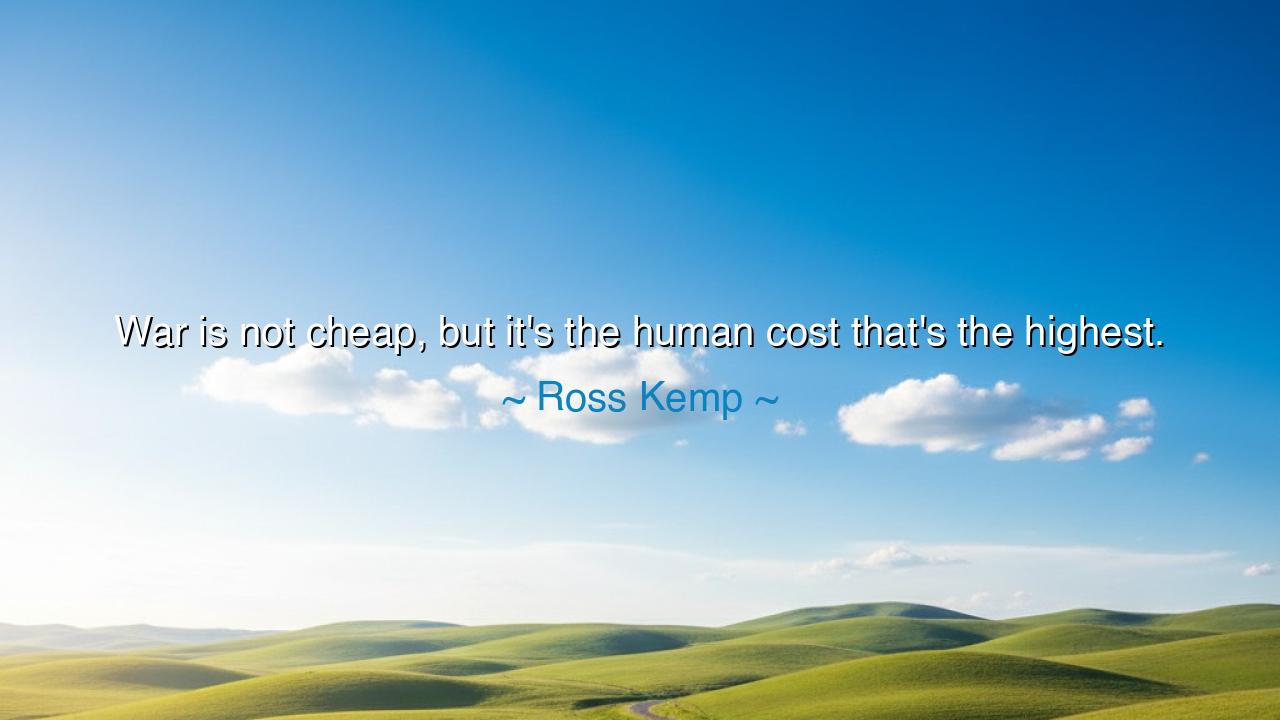
War is not cheap, but it's the human cost that's the highest.






Hear, O listener, the words of Ross Kemp, who walked among soldiers and civilians alike, who bore witness not only to the clash of weapons but to the tears of the broken. He declared: “War is not cheap, but it’s the human cost that’s the highest.” In this truth is revealed the folly of men who count war in gold, in oil, in steel, while forgetting that its true price is written in flesh, in blood, in the silence of graves. Weapons may be bought, cities may be rebuilt, but no treasure of kings can restore a single child slain, a father lost, a mother’s heart torn apart.
For when nations speak of war, they speak first of expense. They weigh the price of aircraft, the cost of tanks, the burden upon treasuries. Yet the greater debt is owed not in coin, but in sorrow. The human cost cannot be measured by accountants. It is the wounded who carry scars into old age. It is the orphan who grows without a parent’s embrace. It is the refugee who wanders with no home but memory. This is the currency of war, and it is the highest of all.
Consider the Battle of the Somme in the First World War. Britain and her allies poured out gold without measure to arm their men. But on that single day of July 1, 1916, more than fifty-seven thousand soldiers were killed, wounded, or lost—men cut down like wheat in a storm of fire. The governments recorded the cost of shells and supplies, but no ledger could contain the loss of so many lives, each a world unto itself. The human cost was beyond reckoning, and the grief it sowed lasted for generations.
And think also of the wars of our own age, where technology brings weapons more precise, yet civilians still bear the weight of suffering. In Iraq, in Afghanistan, in countless unseen corners of the earth, families are shattered not only by bombs, but by the endless fear, the displacement, the hunger that follows. Ross Kemp, who traveled these war zones, did not speak as one quoting figures from afar, but as one who saw with his own eyes the toll upon the human spirit. His words echo like a bell of warning: wealth may recover, but the lives destroyed will never return.
The meaning of his saying is not only to condemn war, but to awaken compassion. It is to remind rulers, soldiers, and citizens alike that whenever they speak of conflict, they must first think of those who will pay the highest price. War is not cheap—yet the deepest expense is always borne by the powerless, by the innocent, by those who never chose the battle. It is easy to write budgets for weapons; it is harder to console a mother who buries her child.
The lesson, therefore, is this: when we weigh the choice of war, let us place the human cost at the forefront, not the shadow. Let us remember that money spent can be regained, but lives lost are eternal. And in our daily lives, let us act in the same spirit. Do not place wealth above people, ambition above compassion, power above love. For even outside of war, the true wealth of a people lies not in gold, but in the dignity and safety of its children, its families, its communities.
So, O child of tomorrow, carry this wisdom with you: speak against wars of ambition, resist those who reduce lives to numbers, and cultivate peace in your own circle of life. For Kemp has told us plainly, and truly: war is not cheap, but it’s the human cost that’s the highest. Let us be guardians of humanity, lest we forget the greatest treasure of all is life itself.






ATMinh Anh Tran
Ross Kemp’s comment brings to light the often-ignored reality of war—the staggering human cost. It's not just the lives lost in combat but also the long-lasting effects on survivors, families, and entire societies. Can the true consequences of war ever be measured, and do we ever fully understand them before engaging in conflict? How do we justify the loss of so many lives for political or strategic goals, and can we truly come to terms with this?
MHminh ho
Kemp’s quote makes me think about the human suffering behind every war, beyond just the financial or strategic aspects. When we discuss war, we often hear about the costs in terms of money, resources, and military objectives, but how often do we acknowledge the deep, irreversible losses suffered by families and communities? Does the sheer scale of human pain make war even more unjustifiable, or is it just an unfortunate reality of global politics?
-836- Uyen Vy - 81
I agree with Kemp’s statement about the human cost of war, but it also raises a question: can we ever truly grasp the full scale of that cost? The physical toll is obvious, but what about the mental and societal consequences? How do we deal with the long-term trauma faced by soldiers and civilians alike? Can society ever fully recover from the damage war causes, or does it leave scars that persist through generations?
VTHoai Vu Thu
Ross Kemp’s quote highlights the undeniable truth that while the financial cost of war is staggering, the real price is in human lives. It’s easy to focus on economic figures when discussing war, but how do we truly quantify the emotional and physical toll on soldiers, civilians, and entire societies? Can we ever put a true value on human suffering, or does war force us to overlook the profound cost of lives lost?